A History of Violence
 for strong brutal violence, graphic sexuality, nudity, language and some drug use.
for strong brutal violence, graphic sexuality, nudity, language and some drug use.
Reviewed by: Chris Monroe
STAFF WRITER
| Moral Rating: | Very Offensive |
| Moviemaking Quality: |
|
| Primary Audience: | Adults |
| Genre: | Thriller |
| Length: | 96 min. |
| Year of Release: | 2005 |
| USA Release: |
September 23, 2005 (limited to top 10 markets) |
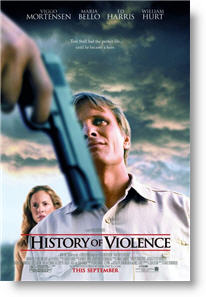
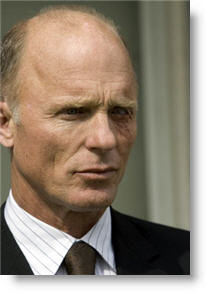
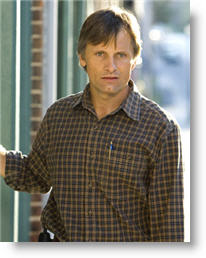
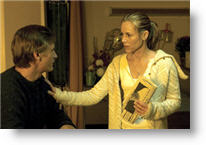

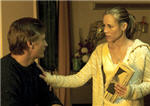
How does viewing violence in movies affect the family? Answer
Every time you buy a movie ticket or rent a video you are casting a vote telling Hollywood “That’s what I want.” Why does Hollywood continue to promote immoral programming? Are YOU part of the problem?
Survival of the fittest—Critic Roger Ebert has quoted Director David Cronenberg as saying “I am a complete Darwinian.” According to Ebert this film “is in many ways about the survival of the fittest — at all costs.”
Visit our enlightening Creation/Evolution issues site…
Some Biblical heroes:
| Featuring |
|---|
| Viggo Mortensen, Maria Bello, Ed Harris, William Hurt, Ashton Holmes |
| Director |
|
David Cronenberg |
| Producer |
| Kent Alterman, David Cronenberg, Cale Boyter |
| Distributor |
“Tom Stall had the perfect life… until he became a hero.”
Here’s what the distributor says about their film: “‘A History of Violence’ stars Viggo Mortensen as a pillar of a small town community who runs a diner and lives a happy and quiet life with his wife (Maria Bello) and two children. But their lives are forever changed when Mortensen thwarts an attempted robbery and is lauded as a hero by the media, attracting the attention of some mobsters (William Hurt and Ed Harris) who believe he is someone else.”
In the Gospel of John, Jesus tells a man that he must be born again. In A History of Violence there is a kind of analogy to this idea of being born again, and shows that this process is not always the easiest path. Still, one theme that comes across very clear is that people are in fact able to change.
Tom Stall (Viggo Mortensen) lives peacefully with his family in the small, quiet town of Millbrook, Indiana. After fighting off two murderers at the diner he owns and operates, Tom suddenly becomes a hero and attracts national attention. Now Tom is not only famous, but also a target for some mysterious mobsters who encroach on him, his family and his way of life. The only way out for Tom is to confront these men head on.
The title alone to this movie is a clear indicator concerning its content. There are many graphically violent incidents throughout and some grotesque images of people fatally wounded. Furthermore, there is also some foul language, including God’s name being taken in vain and the f-word. Beyond that, there are a few intense sex scenes involving nudity and explicit situations. This film is a very strong rated R movie.
Tom Stall’s wife, Edie Stall (Maria Bello) tells him that he is the best man she has ever known. At another point, Tom tells her, “I wasn’t born again until I met you.” At his diner, one of the patrons makes an off-handed comment to Tom saying, “I’ll see you in church.” Tom is obviously a decent, honest man with a good reputation with his town. He is a man passionately in love with his wife and has two outstanding children. In many ways, Tom’s life is a very ideal one—but it has not always been this way.
Tom’s change of life in this story gives us a good analogy of what it is like for someone when they turn their life over to Christ. The old life passes away and the new life comes. The old man (sinful nature) has to completely die, while the new life of Christ Jesus takes its place, allowing God to live through us. The conflict in this story is centered around one man who must fully commit to the good choices he has made and completely cut himself off from the old way of life he used to know. One scene even involves a kind of baptism, if you will, showing Tom washing himself in a lake with water. It happens immediately after he completely cuts himself off from his old way of life.
There are many discussions that could ensue from a film like this one. While it is very violent, there is still an anti-violence message in it, specifically in Tom relating with his teenage son. It’s clear his son begins to follow his path, but there is a significant moment when Tom takes a gun away from his son. It seemed to indicate how Tom is keeping this way of life from being part of his son’s future.
The acting and directing for this film are very rich. It seems it was directed very deliberately, with a clear plot and clear intentions. The filmmaking is very honest and the drama effective. It is a mature film in many respects, and if you can handle some of its content, it could be worth seeing.
Violence: Heavy / Profanity: Heavy / Sex/Nudity: Heavy


Extremely Offensive / 4
Offensive / 5
After the main character, Tom Stalls, kills his assailants, it always shows entirely too much gore and blood. It’s very offensive, very graphic. There are at least 5 instances of that. Later in the movie (when we finally decided we’d had way too much and left the theatre), there is a scene where the couple gets physically abusive to each other—pushing, slapping, and cussing at each other. Then, they begin to make out—then it goes into a very very, very graphic sex scene. Although the only nudity we saw (at that point before we left) was his behind and her legs and hips when he’s removing her panties, the sex scene was 3-5 minutes long and very explicit.
We were so offended by everything we saw and wish anything that we did not go. I cannot, with good conscience, remain complacent and not say a word. I had to let at least one person know how that movie made me feel dirty, violated and condemned. If you’re planning on going to this movie, I’d highly recommend you reconsider. THe plot only gets as good as the previews let on. Definitely not worth your time or your spirit.
Extremely Offensive / 2
Better than Average / 4
I am having an incredibly hard time understanding how critics or anyone could think this movie was well made. This movie was loaded with over-dramatic moments, cheesy lines, and TERRIBLE ACTING AND WRITING. No offense to high school theatre departments, but this would not be considered a well written movie if it was written by students. People in the theatre were laughing out loud at what were supposed to be the dramatic scenes.
The critics who write that this movie is “captivating” or “genius” must have ulterior motives (kissing up to the production company or director).
I am terrified at the thought of how many men and teenagers will see the images in this movie. Please spread the word about how graphic this movie is and the blatant nudity that is shown. Even without these images this movie is CHEESY; spend the money elsewhere.
Extremely Offensive / 1
The acting is horrible from everyone except for the 3 main characters (Viggo Mortensen, Maria Bello, and Ed Harris are always wonderful). The dialogue was incredibly unrealistic, and many of the scenes made me groan and ask “Are you kidding me??”
The plot itself made absolutely no sense (unless, by some miracle, the ending filled in all the holes). And the graphic sexual content was so incredibly unnecessary!
The scene that finally caused my girlfriend and I to leave the theater was easily the most disturbing and unbelievable. Tom and his wife get into a fight in which she is slapping and kicking him, and he attempts to choke her several times. Apparently that is what turns a woman on, and they end up having VERY graphic, VERY violent sex right on the stairs. Are you kidding me??
Extremely Offensive / 2½
Very Offensive / 5
Editor’s note: Critic Roger Ebert has quoted the director of this film (David Cronenberg) as saying “I am a complete Darwinian.” According to Ebert this film “is in many ways about the survival of the fittest — at all costs.”
I felt dirty after watching this film and forced myself to sit until the end. I have a 17 year old that I would never recommend see this film. As an adult, I came away confused as to the reason for it, but alas I read the “Darwinian” quote and understand it.
You find yourself cheering for the teenage son as he “defends” himself against the school bully, but midway through I thought, “This is nuts.” Is this what we want to show our children? Beat someone senseless if they bully you? Don’t we have enough of that already? It almost made a farce of the “Turn the other cheek” idea of Christian love. As the boy “turned the other cheek” the bullying got worse. When he beat the other boy senseless, he gained respect from others. NO redeeming qualities at all.
Extremely Offensive / 3
In that movie about people lusting over gaping leg wounds and howling ambulance sirens, Holly Hunter gives a remarkable performance as a woman addicted to the seduction of violence and pain. The movie is a shattering experience, much more so than the wan, television-like movie of the same name released this summer.
“A History of Violence” is about truth, and the consequences of denying the truth. Even if the main character comes out of the desert after three years, and begins a new and better life, it’s still only part of the whole life. He will always be what he was before (the good thief is a good man, a redeemed man, but he’s still a thief) even if he does a good job of dissembling his past, and his present. Even his family—his wife and his son (the golden haired daughter doesn’t fit in here)—are uncomfortable with both the old and the new husband/father. Both are uncomfortable in their own skins, and both seem to be grasping for something that isn’t there.
Viggo Mortensen gives a vapid performance of a vapid man. He is completely outshined by Ed Harris, the menacing, but all too truthful, thug who, like the gods from Greek mythology or like Samson, sees things as they are only after he is blinded. The film’s other great performance is by William Hurt who plays a mobster, a dark prince who can crack jokes and crack skulls, and wouldn’t be found dead on a psychiatrist’s couch. Hurt’s gangster is the real enchilada. And it’s great to see him back on the screen again. Even in this cameo.
Very Offensive / 3½
After seeing this movie, I was sure it was X-rated. Little did I know, there is no X anymore, but still shocked that this movie was not NC-17. I became aware that even R-rated movies can have children in there watching this debauchery. I felt sick to my stomach and wished I’d left. I’m 57 years old and lived thru the 60s and 70s. I’ve always considered myself a liberal. I will be careful to read this site, before I go to another movie.
The sex scenes were not necessary. Today’s society needs to see that and the raunchier the better. I think those commenting before me described the scenes and most people don’t want to see porn or violence against women. The blood and guts made me realize whoever made this movie obviously couldn’t express himself without making it so graphic. Well, now I know, Cronenburg was a horror movie junky.
It’s interesting to me that our society will jump up and scream when someone says something that may be considered politically incorrect. Even costing someone there job. Why are we allowing this trash to be put out there.
I’m sure each of these talented actors will someday wish they had never been apart of this pathetic waste of energy. I pray that they will know the truth. As a christian, I was appalled at the comments by one group that said their Bible study went to this movie and stated they were “speechless,” it was so good. If we, as Christians, have become so numb to the temperature of the water, we deserve to boil. The best thing I can say about this movie is, it opened my eyes to take responsibility for what I feed into my spirit. I would hate to think that I had to explain to God why I would be apart of something so evil. Yes, I’m sure there was some deep, artistic, moral there. Evil begats Evil. If you like to feel like you were involved go see it.
Extremely Offensive / 1
I feel the sex scenes really ruined the movie for me. It made me feel very uncomfortable. I thought the first sex scene would be the last, but close to the end there came another one. Why did they even put it in there? It didn’t even flow with the movie. This is what is wrong with our society that, yes this couple was married, but they make the sex seem perverted. I want to teach my children that sex is not some cheap thrill for married people but a loving expression.
Very Offensive / 3½

So when a limo full of goons—led by a tremendously sinister Ed Harris—arrive from Philadelphia, they claim that Tom is, in fact, “Joey,” a character who, by implication, is quite unlike the law-abiding, respectable family man, Tom Spall.
With his family and his own life under threat, Tom is forced to confront his demons from a previous life. In doing so he becomes gradually estranged from his loyal and loving wife, Edie (Maria Bello) and his two children. Violence erupts as Tom becomes more and more “Joey” as he desperately battles to save the new world he has built from the attentions of the mob.
What is disturbing about the film is the way it appears to feed the audiences lust for violence yet questions the desire for it. Violence (as in many old Western films) is seen as the solution to the human situation, yet it is done here in such a way that we are both fascinated and repelled by it. It appeals to our baser instincts yet appalls us with its cold-blooded ruthlessness.
In the demented world conjured up by Cronenberg, not only does violence become a solution to the way out of Tom’s problem, but it’s also used as a sexual fetish. So when Edie becomes repelled by Tom’s other self and lashes out at him, he uses his superior physical strength to force her to have sex with him. Shades of the Marquis de Sade. No wonder he spends the night on the sofa!
This is a top draw suspense thriller, excitingly directed and very well acted. But be warned, the violence is graphic, the (two) sex scenes are explicit and the script is splattered with obscenities and profanities, as the movie generates a sickening feeling of moral unease typical of Cronenberg’s anarchic nihilism.
The final disturbing feature of the film is that Tom’s past simply won’t go away in spite of his obvious efforts to have done with it. “I was born again when I met you,” he tells Edie. “I spent three years in the desert getting rid of Joey.” But when Tom’s world is threatened, Joey is only too willing to surface to violently defend it.
Cronenberg here appears to have (unwittingly?) stumbled on to a truth taught in the Bible—that is, however much we might try to reform, the person we once were is only too willing to come out when he gets the chance. This is what the Apostle Paul means when he tells us: No matter which way I turn, I can’t make myself do right. I want to, but I can’t. …It seems to be a fact of life that when I want to do what is right, I inevitably do what is wrong. (Romans 7:18-21 NLT)
What we need, according to Paul, is not just moral reformation but spiritual transformation. We all have a “Joey” inside us somewhere, waiting to come out. Hopefully, he’s not as violent as Tom’s alter ego, but he still leads us to do things that make us ashamed. What we need to do is to bury him once and for all at the cross of Jesus. You see, Jesus died so that the “Joeys” in our past could be dealt with once and for all, for the Bible teaches us that if any man is in Christ, he becomes a brand new person: old things have passed away and all things are become new. (2 Corinthians 5:17) And that’s the point that Cronenberg’s film misses.
My Ratings: Extremely Offensive / 4